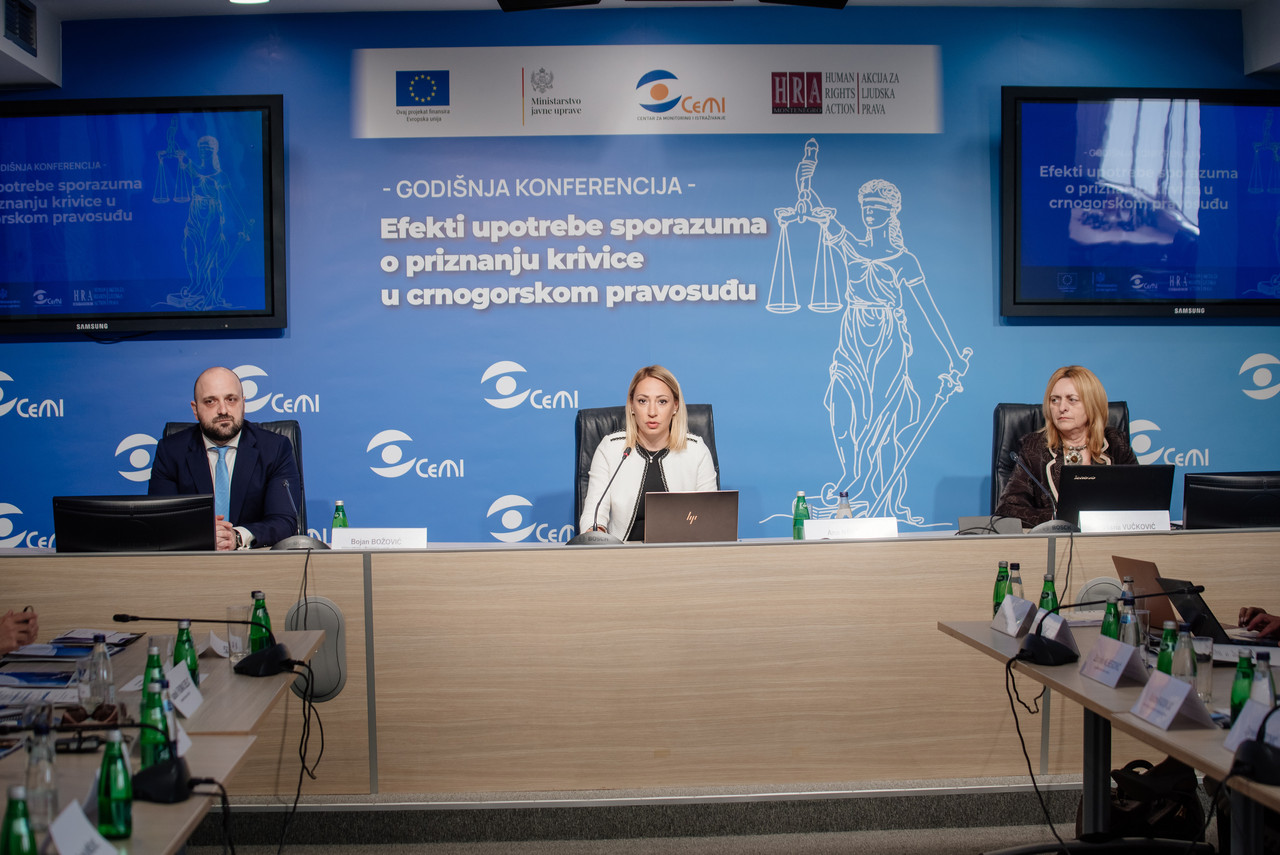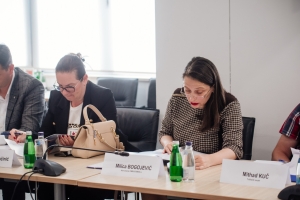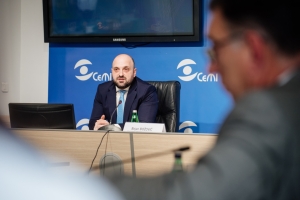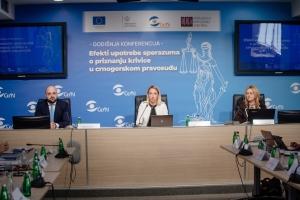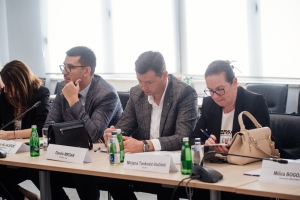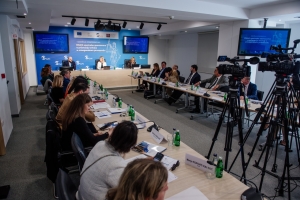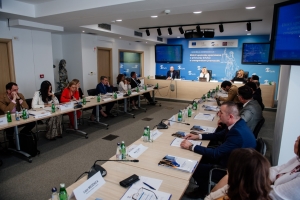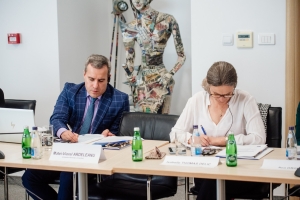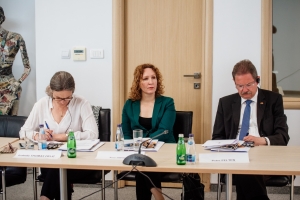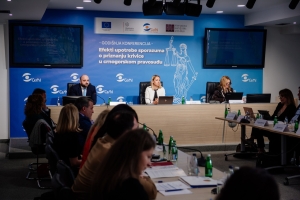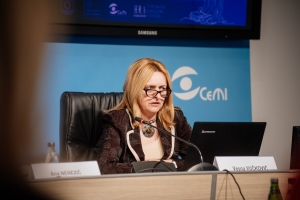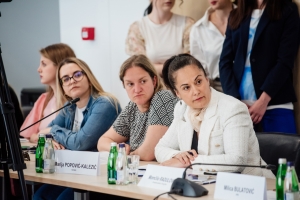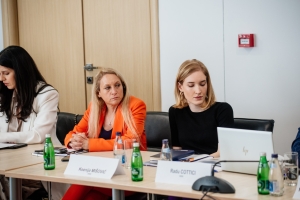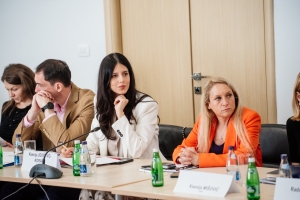Judicial authorities have not found a way to limit the use of plea agreements for certain criminal offenses, to protect the interests of fairness and the rights of the injured party, which is why the advantages of that legal institution have turned into their opposite in a significant number of cases.
This was announced during the introductory presentations at the annual conference "Effects of the use of plea agreements in the Montenegrin judiciary", organized by the Center for Monitoring and Research (CeMI), within the project "Access to justice and human rights in Montenegro - trial monitoring project 2021 -2023" implemented in cooperation with the Human Rights Action (HRA), which is financed by the European Union and co-financed by the Ministry of Public Administration of Montenegro.
The CEO of CeMI, Ana Nenezic, recalled that the main goal of introducing this institute into the Montenegrin legislation was the need to create a normative basis for the rationalization of criminal proceedings, as well as faster and simpler completion of criminal proceedings, faster resolution of cases and reduction of costs, provided that is the procedure carried out in accordance with the law and that the penalties are within the range determined by the law.
"Our findings indicate that the advantages of plea agreements have turned into their opposite in a significant number of cases, because judicial authorities have not found a way to limit the use of plea agreements for certain crimes, protect the interests of fairness and the rights of the injured. "The primary challenges in the application of the plea agreement are related to the range of criminal offenses to which this institute applies, as well as to the issue of penal policy," said Nenezic.
According to her, an appropriate balance was not achieved between the crimes committed and the sanctions imposed.
"Namely, we are of the opinion that plea agreements should not be concluded for serious crimes, as is the case in the majority of concluded agreements (such as organized crime, high corruption, trafficking of drugs, weapons and people, aggravated murder, domestic violence) which, bearing in mind the method of execution and/or consequences, should not be the subject of the agreement.) or it should be a rare practice justified by the circumstances of each specific case, which is not the case now," Nenezic said.
She believes that it is particularly worrying and inadmissible that agreements are also concluded for the criminal offenses of Illicit sexual acts and child abuse, which, as she reminded, CeMI pointed out in the previous report.
"In the sentencing procedure, the courts applied the institute of mitigation of punishment to a large number of cases and imposed sentences below the legal minimum." Also, in practice, it has been observed that state prosecutors conclude agreements with persons who have been convicted several times (some persons even up to 12 times), while on the other hand, the courts accepted such agreements, which brought the judicial system into question as to the achievement of the purpose punishment", Nenezic pointed out.
She explained that the Criminal Procedure Law clearly stipulates that the agreement must be in accordance with the interests of fairness and that the sanction must correspond to the purpose for which it was imposed.
"In Montenegro, this is not the case and predictable judicial practice has not yet been developed regarding the application of plea agreements, as previously stated in the CeMI Report from 2016," Nenezic said.
She reminded that the European Commission has been pointing out precisely the same problems for years and states that "In the field of fighting organized crime, Montenegro is invited to take concrete measures to limit the application of plea agreements to exceptional cases, in order to increase the transparency and credibility of the judiciary response to organized crime through a more deterrent and consistent sanctioning policy. "
"Identical assessments were repeated in the Report from 2021, so that in the last Report of the European Commission (2022) more specific problems regarding the application of the institution of plea agreements were noted: The use of plea agreements must be applied with extreme care, for the right purposes and in compliance with all necessary protection measures. A legal analysis of the costs and benefits in the interest of justice should be carried out systematically when using this mechanism. In no case can the sanctions be below the legal minimum," said Nenezic.
She said that transparency must be improved, stating that it is not possible to find agreements on the websites of competent institutions and that it is very difficult to reach concluded agreements.
"Looking at the period from 2010 to 2019, and the number of plea agreements concluded and accepted by the courts, it is evident that the number of agreements at the level of all prosecutor's offices and courts is constantly increasing." The largest number of agreements were concluded in 2020, 559 agreements, while the decline occurred in 2021, when we reach the level of 2019, that is, 290 concluded agreements," Nenezic said.
She pointed out that the implementation of the agreement was previously most developed at the SSP level, until 2020.
"Now the primacy is occupied by HSP and BSP Podgorica. The financial effects of the agreement are present, but it is still questionable to what extent their conclusion contributed to achieving better results in financial investigations, the scope of which in the cases of the so-called of high corruption remained extremely modest, in relation to the assumed (but not proven) income generated by criminal activity", Nenezic concluded.
The Acting President of the Supreme Court, Vesna Vuckovic, said that the issue of the application of the plea agreement in the professional and lay public has taken on exceptional importance.
"The solid framework of the Criminal Procedure Code that exists must be changed, but in accordance with the standards and good practices shared with us by the member states of the European Union." In this direction, we analyzed the penal policy for the most serious crimes in court practice, starting from the constitutional definition and the definition of Montenegro as a state based on the rule of law, the principle of legality and the competence of the Supreme Court and the State Prosecutor's Office prescribed by the Constitution, and we formed a working group for the development of guidelines for the implementation of the plea agreement, which is composed of judges and state prosecutors of the highest instances," said Vuckovic.
He believes that in this way they expressed a clear determination to contribute to the respect of human rights and the rule of law with the available institutional capacities, which forms the basis of the guidelines, as well as to provide support for the implementation of reforms.
"The working group has completed its work on the development of guidelines for the implementation of the plea agreement. The document, which is comprehensive, includes guidelines for the actions of state prosecutors when concluding a plea agreement, as well as guidelines for judges in deciding on a plea agreement," Vuckovic said.
She explained that the guidelines elaborate the material and procedural rules that state prosecutors must adopt in the procedure and in the process of concluding plea agreements in cases of organized crime, corruption and other cases that attract increased public attention.
"The guidelines provide collegial and advisory support for judges in the process of deciding on an agreement in order to ensure the unification of court practice, the unification of penal policy in such a way as to improve the repressive and preventive function of the judiciary," said Vuckovic.
She pointed out that on the basis of this document, the competent entities will proceed with the development of a joint technical solution in the form of a table that will establish and facilitate the monitoring of the correct policy of the courts, making it predictable in cases of decision-making on the amount of the fine and other imposed sanctions on the basis of the agreement, "all in with the aim that state prosecutors can propose a sentence that was somewhat lower than what can be expected if regular proceedings are conducted against the defendant".
State Secretary in the Ministry of Justice and member of the Prosecutor's Council, Bojan Bozovic, said that the plea agreement is a good and high-quality institution that has been transferred to the Montenegrin legislation, stating that until now, for certain reasons, it has not achieved its purpose.
"From time to time, on a case-by-case basis, he could or did turn into his opposite." There were many reasons for this, and talking only about one subject, institution, legal solution is certainly not the way to solve this problem. That is why in the last period, multi-institutional, multi-layered and through different experiences and different knowledge of people who deal with this issue, we came to assumptions for a future, better and better solution and implementation through the practice of plea agreements", said Bozovic.
He pointed out that the Ministry of Justice, through the reform of the criminal legislation, is also dealing with the plea agreement, pointing out that in parallel with that, through the initiative of the Prosecutor's Council and the Working Group, we have come up with guidelines that will help in the future application of the plea agreement, through future changes of the Law on Criminal Procedure and Article 300, which refers to the conclusion of a plea agreement.
"When it comes to the Law on Criminal Procedure and the Criminal Code, they have been sent to the European Commission in the form of a draft, and I believe that they will submit comments in a similar time interval, and that we will then have a clearer picture of which direction to go in," said Bozovic.
